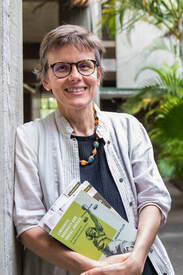Plenary sessions
 Suresh Canagarajah
Suresh Canagarajah
The inaugural Tim McNamara Lecture will be given in the 2023 Conference. The lecture honours the distinguished contribution Tim McNamara has made to the fields of Language Testing and Assessment, and to Applied Linguistics more generally. The inaugural lecture will be delivered by Suresh Canagarajah.
SURESH CANAGARAJAH
Suresh Canagarajah is the Edwin Erle Sparks Professor of English, Applied Linguistics, and Asian Studies at Pennsylvania State University. He teaches courses in Global Englishes, Multilingual Academic Writing, Sociolinguistics, and Decolonization Studies. He taught earlier in the University of Jaffna, Sri Lanka, and the City University of New York. He was formerly the editor of the TESOL Quarterly and the President of the American Association of Applied Linguistics. His Routledge Handbook on Language and Migration (Routledge, 2017) won the 2020 best book award from the American Association of Applied Linguistics. His latest publication is Language Incompetence: Learning to Communicate through Cancer, Disability, and Anomalous Embodiment (Routledge, 2022).
Plenary topic: Assessing Crip Translingual Practices
"Crip" from disability studies draws from connotations of fracture, immobility, and constraints to highlight how such conditions of vulnerability can be resourceful and generative of communication and knowledge. In this talk, I present interactions from both disabled and "non-disabled" contexts to demonstrate how vulnerability is at the heart of all communication. Drawing from the expansive communicative strategies and semiotic resources adopted for meaning-making in these contexts, I argue for reorienting language analyses and pedagogies along constructs introduced by decolonization and disability studies. The talk will illustrate the challenges applied linguists will face in assessing meanings as emergent, distributed, and nonnormative.
SURESH CANAGARAJAH
Suresh Canagarajah is the Edwin Erle Sparks Professor of English, Applied Linguistics, and Asian Studies at Pennsylvania State University. He teaches courses in Global Englishes, Multilingual Academic Writing, Sociolinguistics, and Decolonization Studies. He taught earlier in the University of Jaffna, Sri Lanka, and the City University of New York. He was formerly the editor of the TESOL Quarterly and the President of the American Association of Applied Linguistics. His Routledge Handbook on Language and Migration (Routledge, 2017) won the 2020 best book award from the American Association of Applied Linguistics. His latest publication is Language Incompetence: Learning to Communicate through Cancer, Disability, and Anomalous Embodiment (Routledge, 2022).
Plenary topic: Assessing Crip Translingual Practices
"Crip" from disability studies draws from connotations of fracture, immobility, and constraints to highlight how such conditions of vulnerability can be resourceful and generative of communication and knowledge. In this talk, I present interactions from both disabled and "non-disabled" contexts to demonstrate how vulnerability is at the heart of all communication. Drawing from the expansive communicative strategies and semiotic resources adopted for meaning-making in these contexts, I argue for reorienting language analyses and pedagogies along constructs introduced by decolonization and disability studies. The talk will illustrate the challenges applied linguists will face in assessing meanings as emergent, distributed, and nonnormative.
 Ingrid Piller
Ingrid Piller
INGRID PILLER
Ingrid Piller is Distinguished Professor of Applied Linguistics at Macquarie University, Sydney, where she previously served as Executive Director of the Adult Migrant English Program Research Centre (AMEP RC). Over the course of her international career, she has also held appointments at universities in Germany, Switzerland, United Arab Emirates and USA. She is a Fellow of the Australian Academy of the Humanities and recipient of a 2018 Anneliese Maier Research Award. Ingrid Piller is an applied sociolinguist with research expertise in intercultural communication, language learning, multilingualism, and bilingual education. She has published, lectured and consulted widely in these areas. Ingrid Piller is the author of Linguistic Diversity and Social Justice (Oxford University Press, 2016), which won the 2017 Prose Award in the Language and Linguistics category and the 2017 BAAL Book Prize. She is also the author of the bestselling Intercultural Communication (Edinburgh University Press, 2nd ed., 2017) and over 400 other publications. Ingrid Piller is a member of the Australian Research Council (ARC) College of Experts, served as editor-in-chief of the international sociolinguistics journal Multilingua (De Gruyter Mouton; 2013-2022) and edits the sociolinguistics portal Language on the Move, through which many of her publications and those of her team, including their research blog, can be accessed. She tweets about linguistic diversity @lg_on_the_move.
Plenary topic: Language testing for university admission
English language proficiency (ELP) is central to the academic achievement of the 1.5 million students enrolled in Australian universities each year. Yet, students are highly linguistically diverse, with a mix of domestic students from English- and non-English-speaking backgrounds and international students from national contexts where English may be the main language, an official language in a multilingual context, or a foreign language with limited communicative functions. How do universities manage students’ linguistic diversity through their admission requirements and set students up for success? In this talk, I examine ELP requirements for university admission in Go8 universities to answer this question. Our language ideological analysis found two categorically different constructs of ELP: inherent ELP based on citizenship, linguistic heritage, and prior education, and tested ELP. These two different conceptualizations of ELP map onto two dichotomous student groups. One of these is deemed to naturally speak English while the other is constructed as deficient and subject to perpetual scrutiny. These language ideological constructs frame ELP as a matter of individual responsibility rather than part of embedded in learning processes. Conversely, they obscure the need for continuous language development of all students and the need for pedagogical innovation in linguistically diverse educational institutions.
References
Piller, I. (2023). How do universities decide whose English needs to be tested for admission? Language on the Move. https://www.languageonthemove.com/how-do-universities-decide-whose-english-needs-to-be-tested-for-admission/
Piller, I., & Bodis, A. (2022). Marking and unmarking the (non)native speaker through English language proficiency requirements for university admission. Language in Society, 1-23. https://doi.org/10.1017/S0047404522000689
Ingrid Piller is Distinguished Professor of Applied Linguistics at Macquarie University, Sydney, where she previously served as Executive Director of the Adult Migrant English Program Research Centre (AMEP RC). Over the course of her international career, she has also held appointments at universities in Germany, Switzerland, United Arab Emirates and USA. She is a Fellow of the Australian Academy of the Humanities and recipient of a 2018 Anneliese Maier Research Award. Ingrid Piller is an applied sociolinguist with research expertise in intercultural communication, language learning, multilingualism, and bilingual education. She has published, lectured and consulted widely in these areas. Ingrid Piller is the author of Linguistic Diversity and Social Justice (Oxford University Press, 2016), which won the 2017 Prose Award in the Language and Linguistics category and the 2017 BAAL Book Prize. She is also the author of the bestselling Intercultural Communication (Edinburgh University Press, 2nd ed., 2017) and over 400 other publications. Ingrid Piller is a member of the Australian Research Council (ARC) College of Experts, served as editor-in-chief of the international sociolinguistics journal Multilingua (De Gruyter Mouton; 2013-2022) and edits the sociolinguistics portal Language on the Move, through which many of her publications and those of her team, including their research blog, can be accessed. She tweets about linguistic diversity @lg_on_the_move.
Plenary topic: Language testing for university admission
English language proficiency (ELP) is central to the academic achievement of the 1.5 million students enrolled in Australian universities each year. Yet, students are highly linguistically diverse, with a mix of domestic students from English- and non-English-speaking backgrounds and international students from national contexts where English may be the main language, an official language in a multilingual context, or a foreign language with limited communicative functions. How do universities manage students’ linguistic diversity through their admission requirements and set students up for success? In this talk, I examine ELP requirements for university admission in Go8 universities to answer this question. Our language ideological analysis found two categorically different constructs of ELP: inherent ELP based on citizenship, linguistic heritage, and prior education, and tested ELP. These two different conceptualizations of ELP map onto two dichotomous student groups. One of these is deemed to naturally speak English while the other is constructed as deficient and subject to perpetual scrutiny. These language ideological constructs frame ELP as a matter of individual responsibility rather than part of embedded in learning processes. Conversely, they obscure the need for continuous language development of all students and the need for pedagogical innovation in linguistically diverse educational institutions.
References
Piller, I. (2023). How do universities decide whose English needs to be tested for admission? Language on the Move. https://www.languageonthemove.com/how-do-universities-decide-whose-english-needs-to-be-tested-for-admission/
Piller, I., & Bodis, A. (2022). Marking and unmarking the (non)native speaker through English language proficiency requirements for university admission. Language in Society, 1-23. https://doi.org/10.1017/S0047404522000689